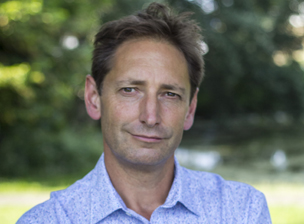 |
Michael Witt, author of Jean-Luc Godard, Cinema Historian |
To celebrate the British Film Institute’s major retrospective of Jean-Luc Godard’s 60-year career, we asked the season’s co-curator Michael Witt, Professor of Cinema at the University of Roehampton and author of the award-winning Jean-Luc Godard, Cinema Historian , for his thoughts on what makes Godard such a unique and important filmmaker. , for his thoughts on what makes Godard such a unique and important filmmaker.
>> Book tickets to any film in the BFI Godard Season
As one of the curators of this three-month Jean-Luc Godard retrospective here at the BFI, can you give a brief overview of what the season will include and recommend some highlights?
I think one of the ambitions of the retrospective is to show everything from 1954, the date of his first short, through to this year, the date of his latest video essay, and pretty much everything in between. So there are two overarching principles: one is to show everything and not to just focus on the highlights or the big hits – and the other is to show all the different forms to emphasize the variety of his work, not just feature films, but shorts, video essays, TV work, occasional satellite pieces – some of which are very, very short – and to demonstrate that all of those function as an integrated part of a continuing artistic project.
In France in the late 1950s and early 60s there was an explosion of new cinematic talents producing an astonishing array of original work, among them Francois Truffaut, Claude Chabrol, Agnes Varda and Jacques Demy. Why, though, do you think it is Jean-Luc Godard, in particular, who became the most representative and emblematic director of the French New Wave?
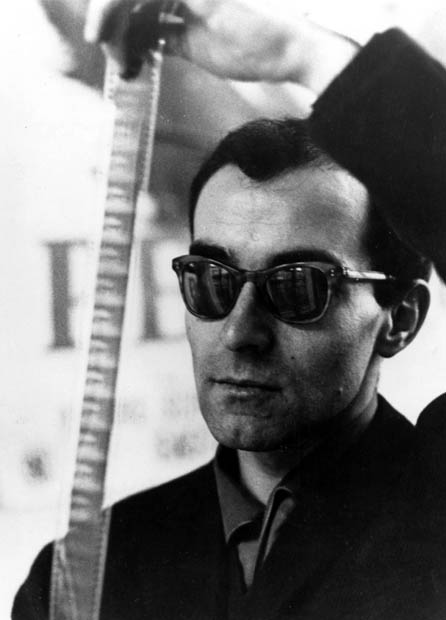 |
Jean-Luc Godard in the 1960s |
I think there are a number of reasons. One of them is talent; I think he was among the most gifted artistically, creatively, and cinematically. I think he also had a gift for self-promotion and so he’s been very good as a self-publicist. I think there’s also the sheer quantity of work he’s managed to produce, not just in phases, but throughout every single decade of the last six decades. Even when he didn’t appear to be doing very much there was a lot of work going on beneath the surface, which later became visible and maybe wasn’t being distributed as widely as it had been. Also I think there’s just the fact that he’s relatively elderly and he’s carried on making work, and he’s still making work, and so I think it’s a combination of lots of things. There’s perhaps one other thing, and this was something that Philippe Garrell noted recently in an interview, and that’s Godard’s intelligence. I mean people like Truffaut, Demy, Varda, they’re all prodigiously gifted, but there was something unique about the combination of knowledge of film history and a kind of enquiring intelligence that made Godard completely distinctive. And I think particularly in relation to people like Demy, even Truffaut, he’s just lived a long time and carried on working, whereas who knows what someone like Truffaut or Demy might have done had they lived longer.
As a young man Godard was enthralled by classic cinema and would go on, as a critic writing for Cahiers du cinéma, to praise many of the great Hollywood directors. Why then, do you think, was he unwilling to use this kind of straightforward narrative cinema when he began directing himself? Why did he feel the need to deconstruct the filmmaking process in his own films?
It’s an enormous question – this question of Godard’s love affair with cinema generally, but with Hollywood in particular, which is also a kind of love/hate relationship. My feeling specifically about how he wouldn’t have been able to fit into that kind of classical narrative mode is that he came out of a different intellectual background, which was essentially that of European modernism, and that he was informed by and knowledgeable about all sorts of artistic currents and movements such as surrealism in art and in culture and also the big philosophical trends of the 30s and 40s. He came out of that highly cultured, artistically cultivated environment of the upper bourgeoisie in France and Switzerland that I think meant that he would never have been capable of, or wouldn’t have wanted to, just make a kind of classical narrative story thing. He always said when he made À bout de souffle (Breathless, 1960) that in fact he thought that he was making a classical film and it was only after he made it that he realised he’d made Alice in Wonderland, and there’s probably some truth in that. But I think with most of the films that come after that he was much more interested in exploring alternative, novel, fresh modes of storytelling.
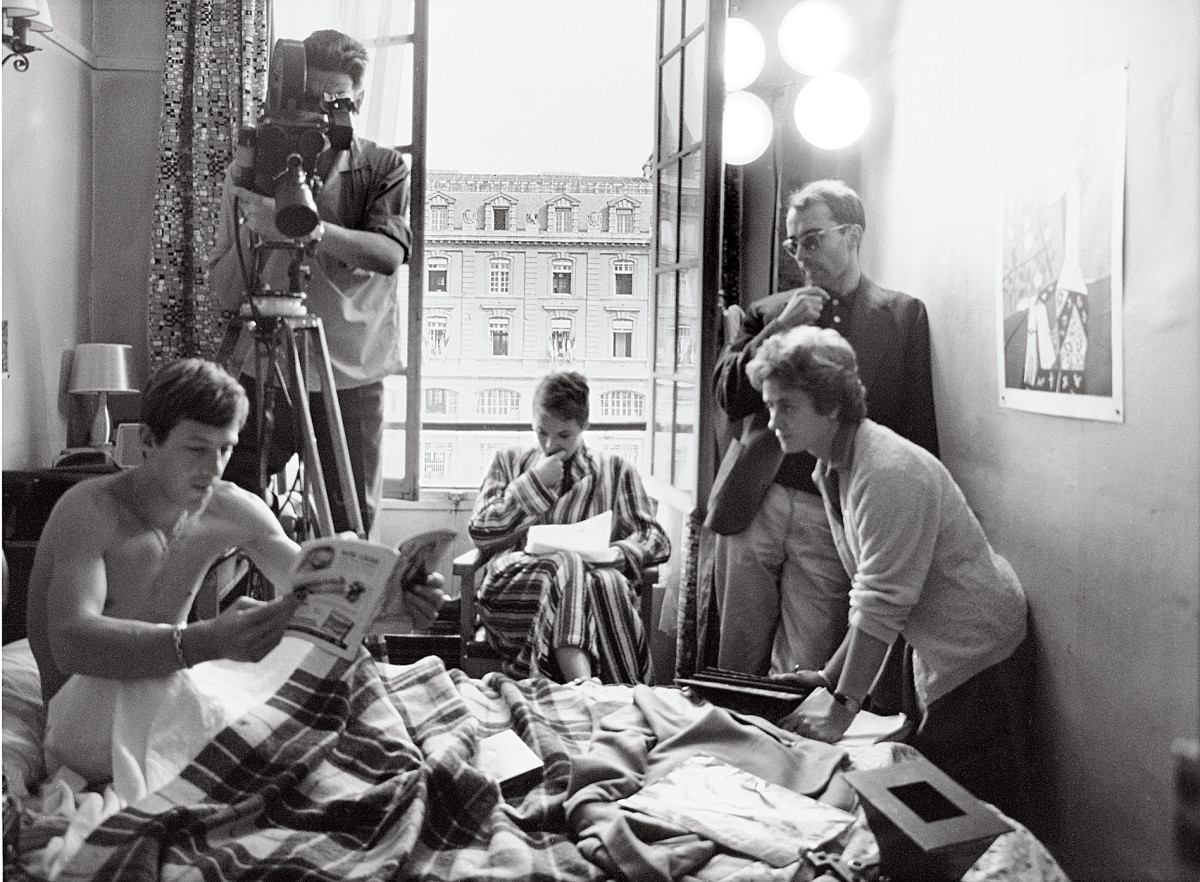 |
Godard directing A bout de souffle (1960) |
Throughout the 1960s, Godard produced films at an astonishing rate, each one of them breaking new ground and extending the language of cinema. People often speak about this aspect of Godard’s work but what strikes me as just extraordinary is how he was able to instil so much of his personal experience and feelings into these films. Do you think Godard is a director who conveys emotion as skilfully as he does conceptual ideas in his films?
I would almost say that’s what categorizes Godard as a unique filmmaker: that ability to communicate in a very sensual way, to communicate feelings – feelings between people, feelings for the world, but in quite a complex, conceptual manner, almost in a kind of philosophical manner. And I think to bring together poetry and philosophy in that experimental use of images and sounds is something that he’s basically done from the beginning. I think there’s another aspect to your question, which is about the autobiographical dimension to his work, and his feeding his own impressions and his own experiences directly into his ongoing project, and that is certainly true. There’s a large subset of films right the way through from the beginning that are essentially self-portraits, or at least they’re strongly autobiographical. So there is certainly that autobiographical strand that goes right the way through the work and actually becomes more pronounced probably from the 70s onwards.
For over a decade from 1968 onwards Godard by and large turned away from mainstream cinema, and his films became increasingly politicized and experimental. Many people feel the films of this period are difficult to appreciate, although I personally think they’re intriguing in their own right. I’d be curious to know how you think these films rate against the rest of his body of work, and why might you encourage people to watch them?
I think broadly that period, 68 through to 79, falls into two quite distinct phases. There’s the work that Godard produced immediately in the aftermath of May 68 that lasted until 1972, which was the work produced under the name of the Dziga Vertov Group and was largely a collaboration with Jean-Pierre Goran, but also with some other key players like Jean-Henri Roger, Armand Marco on camera and so on. Those films are much more explicitly Marxist-Leninist or Maoist. They’re more consciously political and they’re probably more closed and dogmatic in their thinking and in their politics. I think though they are a fascinating document of the trajectory of a large number of left-wing intellectuals in Europe during those periods and during the four years following May 68.
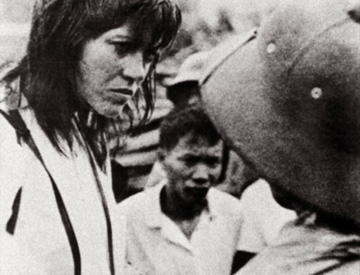 |
Godard's Letter to Jane (1972) |
Personally I think a significant number of those films are really, really interesting. If I were to pluck out some highlights, I think British Sounds, shot in London in 1969, contains some very interesting material and is actually quite unique in its kind of documentation of London and various left-wing environments in and around the south of the UK in that period. I think Lotte in Italia (1970) is very interesting as an indication of how philosophical theory, notably that of Louis Althusser, can be translated into images and sounds. I also think Vladimir and Rosa (1971) is a generally underrated film. It’s one that critics have tended to dismiss as being rather slight conceptually and intellectually and politically, but it’s a lot more fun too and a lot more knockabout and slapstick. So that period really comes to an end with Tout va bien and Letter to Jane in 72. In my personal opinion Tout va bien is a fairly interesting attempt to make a kind of big-budget left-wing film for a wide audience. I don’t think it’s entirely successful. I think Letter to Jane is very, very interesting, particularly in the way that the audio-visual essay has subsequently developed as a form. I think it’s one of the really important early examples of that form.
But then there’s the end of the collaboration with Jean-Pierre Gorin and the beginning of the collaboration with Anne-Marie Miéville and the beginning of the exploration of video and work for television. And I think if the Dziga Vertov Group is interesting historically, as a kind of snapshot of the mentalities of the left-wing intelligentsia, I think the work from 1973 onwards – and the films start appearing from 1974 – is some of Godard’s most important work. So Ici et ailleurs (Here and Elsewhere), which blends 16mm and video, and partly constitutes an auto-critique of the preceding four years and the work of the Dziga Vertov group, is I think one of his most tautly composed and rigorously thought-through films. I also think that Comment ca va?, which is the next film, is an interesting and underrated film, and I really hope people will watch that film and reevaluate it, particularly in terms of its critique of journalism, something that Godard had first-hand experience of during that period.
And then Numéro Deux is the third of the Godard/Mieville films of that period, and it is formally an extraordinary film. It was shot originally on video with a view to it being edited in a more or less linear manner, but then it was going to be too expensive and there was going to be too big a time delay to wait for the transfer from video onto film, so they kind of improvised this montage or collage of video monitors within the 35mm frame, which William Lubtchansky, the cinematographer, just filmed. I think it’s one of the great films of the 1970s full stop.
And then there are the two TV series, which generally get brushed to one side as if people don’t know what exactly to do with them. In the anglophone world it’s been quite difficult, particularly with the first of them, Six fois deux/Sur et sous la communication (1976), to appreciate them properly because the copies have been so poor. They haven’t been subtitled on the whole and they have never been released on DVD or VHS, which has made them really tricky for critics and students to look at. There was a project two years ago to release both of them in France and for various reasons it fell to pieces, but it strikes me as quite urgent, within the context of film and TV studies, for those to be made available with multiple subtitles. The great French critic Raymond Bellour has suggested recently that the impact of Six fois deux on audio/visual culture is comparable to that of Roland Barthes' Mythologies on cultural studies, which seems incredible in this country or outside of the French context. Then there’s the second TV series, France/tour/détour/enfants (1977), which I think is simply one of Godard’s greatest achievements. So both of those are going to be shown: Six fois deux in three blocks, France/tour/détour in two blocks.
Godard returned to more traditional filming with Sauve qui peut (la vie) (Everyman For Himself) in 1980, which was a commercial and critical success. The films that followed in the 1980s and 90s, such as Je vous salue, Marie (Hail Mary) and King Lear, were rarely as successful and often met with controversy or criticism that they were incomprehensible. For those who might only be familiar with Godard’s earlier work, what advice would you give them about how they might approach and best appreciate these later films?
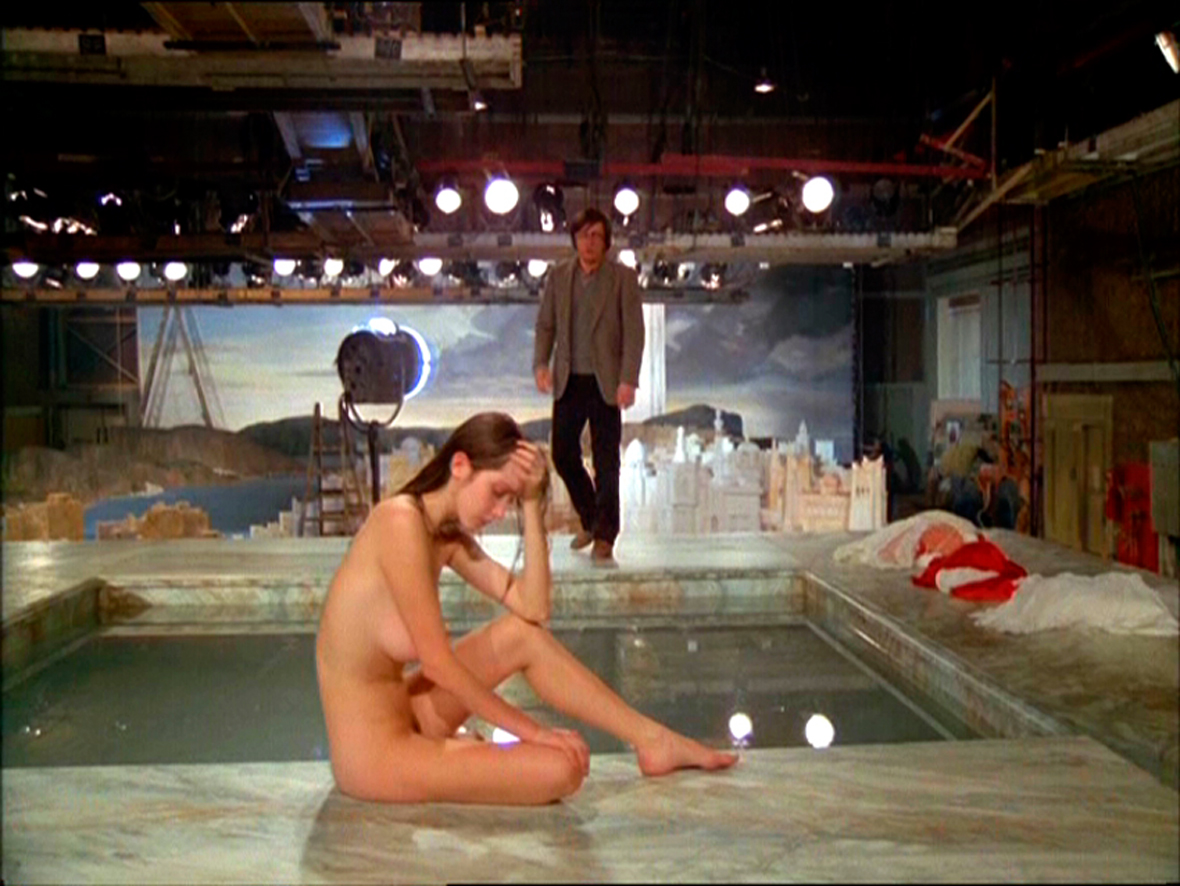 |
Passion (1982) |
I would broadly separate out Godard’s films of the 80s into two categories. From 1979/1980 with Sauve qui peut (la vie) through to Je vous salue, Marie (Hail Mary) in 1985. And then the films of the late 80s, particularly, Soigne ta droite (1987) and King Lear (1987), which I think are in a slightly different category. The critic Alain Bergala has referred to that first grouping as “the films of the sublime”, so films where Godard is interested in questions of natural beauty, in re-engaging with thinking about his work but within the context of the canon of Western music, of Western art, and Christianity. I personally think that of Godard’s feature films, Sauve qui peut and Passion (1982) are two of his most perfectly achieved films. Sauve qui peut was a film where he was investing, in a sense, the discoveries of his video work – particularly the use of slow motion – back into this invention of a new form of narrative, and I think it’s one of his most powerful works, followed closely by Passion, where he restages these great painterly masterpieces from the past and reflects on the relationship between cinema and the heritage of Western painting.
There’s another aspect of these films which also relates to the retrospective and that’s video. Most of these films were produced following the production of video scenarios. So Godard started making video scripts rather than writing scripts, which he would use as exploratory sketchbooks to map out the ideas and to start working with actors. This would then be used as a way of preparing and warming up for the process of filming and then the editing itself. And that’s true of Sauve qui peut, it’s true of Passion, it’s true of Je vous salue, Marie. It’s a very interesting use of video to think about cinema, to theorize cinema, and to reflect on cinema, and the two are kind of operating in parallel during that period. In the later 80s I think the films take a much more philosophical tone. Both Soigne ta droite and King Lear are largely fragmented philosophical collages and they’re quite tough; I mean, they’re not easy, even after repeated viewing. There has been some interesting critical reevaluation recently on Soigne ta droite by a critic called James Williams and by another called Albertine Fox, both of whom have worked on reinterpreting and rethinking Soigne ta droite in particular, but also Godard’s late 80s work generally. I think King Lear is a fascinating film, I remember seeing it when it came out and there were about three of us in a big cinema just off Leicester Square.
It’s one of his most humorous films isn’t it?
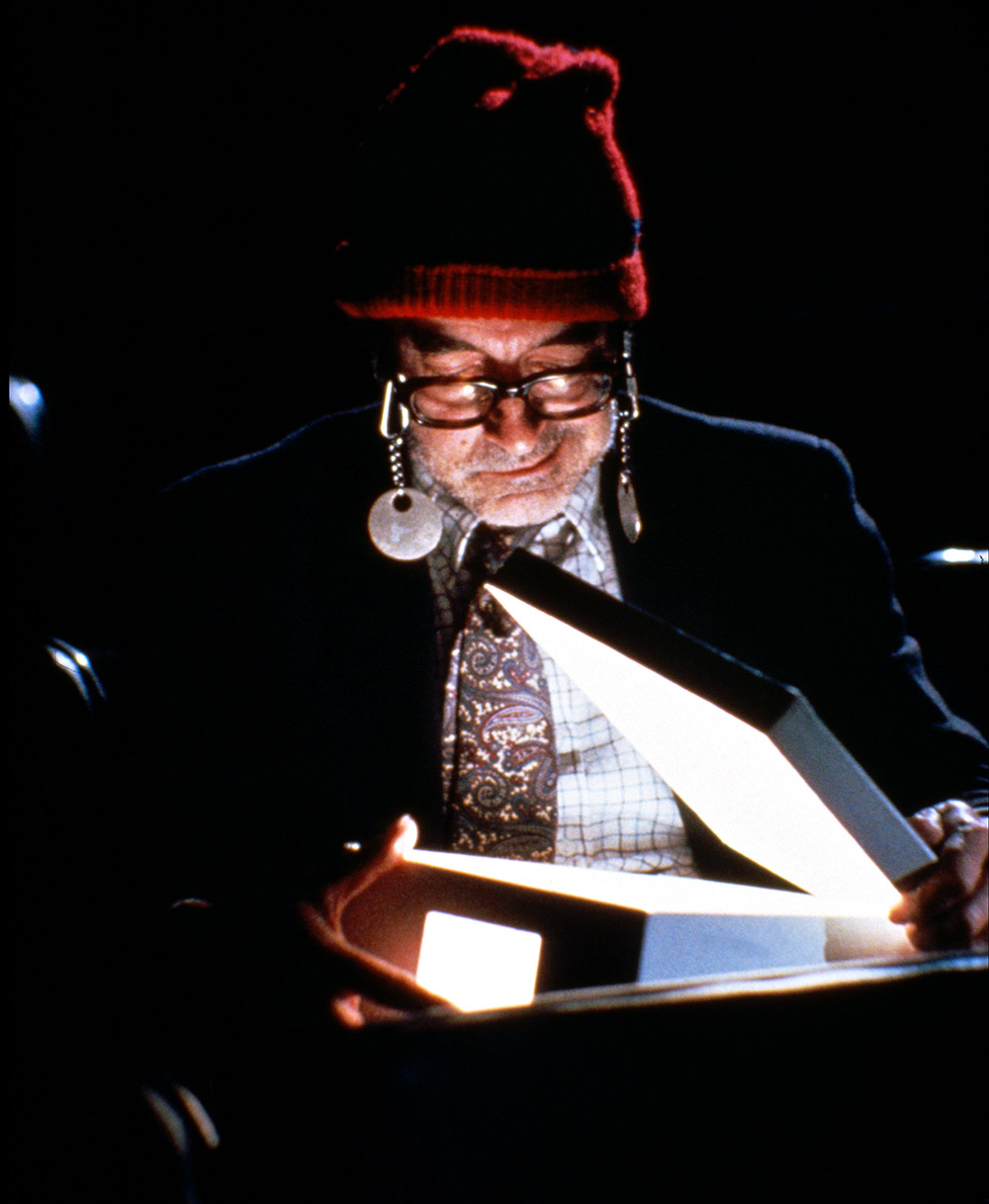 |
Godard acting in King Lear (1987) |
Yes, and I think increasingly with time, I’ve come to like it a lot. And I also think it’s an important film in relation to Histoire(s) du cinéma and Godard thinking about history. It also has one of his most amusing self-depictions as this Dostoevskian idiot, or a kind of Shakespearian fool, or combination of the two, which is a role he has assumed particularly since the beginning of the 80s.
But the other thing I would say about the late 80s is that the best way of appreciating that period is not necessarily the feature films. During this time, Godard made some of his most adventurous, ambitious, and just purely experimental video works. These tended to be commercial commissions, which he would then employ as a means of just freely experimenting with narrative, but above all with sound and image and with videographic form. So there’s one called On s’est tous défilé (1988) that was commissioned by the fashion house Marithé et François Girbaud, which is an extraordinarily playful exploration of the body and of gesture, basically of models on a catwalk. But I think one of Godard’s great films of the late 80s is Puissance de la parole (1988), which he made for France Telecom and which has on the whole been very little seen, but it’s a very, very powerful reflection on communication that combines a tale by Edgar Allan Poe and James M Cain’s The Postman Always Rings Twice, and folds in a Sci-Fi narrative as well. It’s where Godard, really for the first time, explores some of the very rapid intense forms that he will then pursue in Histoire(s) du cinéma.
During this time Godard was, as you have mentioned, also working on an epic 8-part video project called Histoire(s) du cinéma, which is now considered by some as one of his greatest masterpieces, yet it is still relatively little seen. As someone who has written a book about the film could you explain essentially what it’s about and how important it is within the context of Godard’s career?
I think it’s hard to overemphasize how important it is within the context of Godard’s career because it’s a project that he cherished and nurtured, not just for a decade, but basically for three decades. He first started talking about it at the end of the 60s and then first actively tried to get it off the ground in the early 70s. He gave a number of talks on the history of cinema, notably in Montreal and Rotterdam, which he saw as preparatory groundwork for what he always envisioned as a video project. Then he started working on it intensively from the beginning of the 80s onwards until it was finally completed in 98. So it’s something that accompanies the whole of his work from the beginning of the 1970s – so that when I talked about Ici et ailleurs as an important film, in a sense it’s important because it’s doing many of the things that Godard was then becoming interested in, that is: how can archived images and sounds combined with freshly shot material be combined to create history? How can history function through cinema? And that is the first film to really confront that question head on, and it also coincides with the moment that he’s beginning to develop the project actively.
I think that virtually all the work that Godard creates during the 1980s, particularly from the mid-80s through to the late 90s when he completes Histoire(s) du cinéma, is in some way related to it. It’s kind of satellite work, or it’s accompanying notes, or it’s a little side project that’s exploring one aspect of this project. So to give a couple of examples: a film such as Hélas pour moi (1994) is basically a philosophical and theoretical reflection on what it means to make history, but it’s presented in the form of a fiction film. There’s another short film he made called Le Dernier mot in 1988 but set at the end of World War II, and again the key question that that film is trying to explore is: how can one bring the past to life in the present?
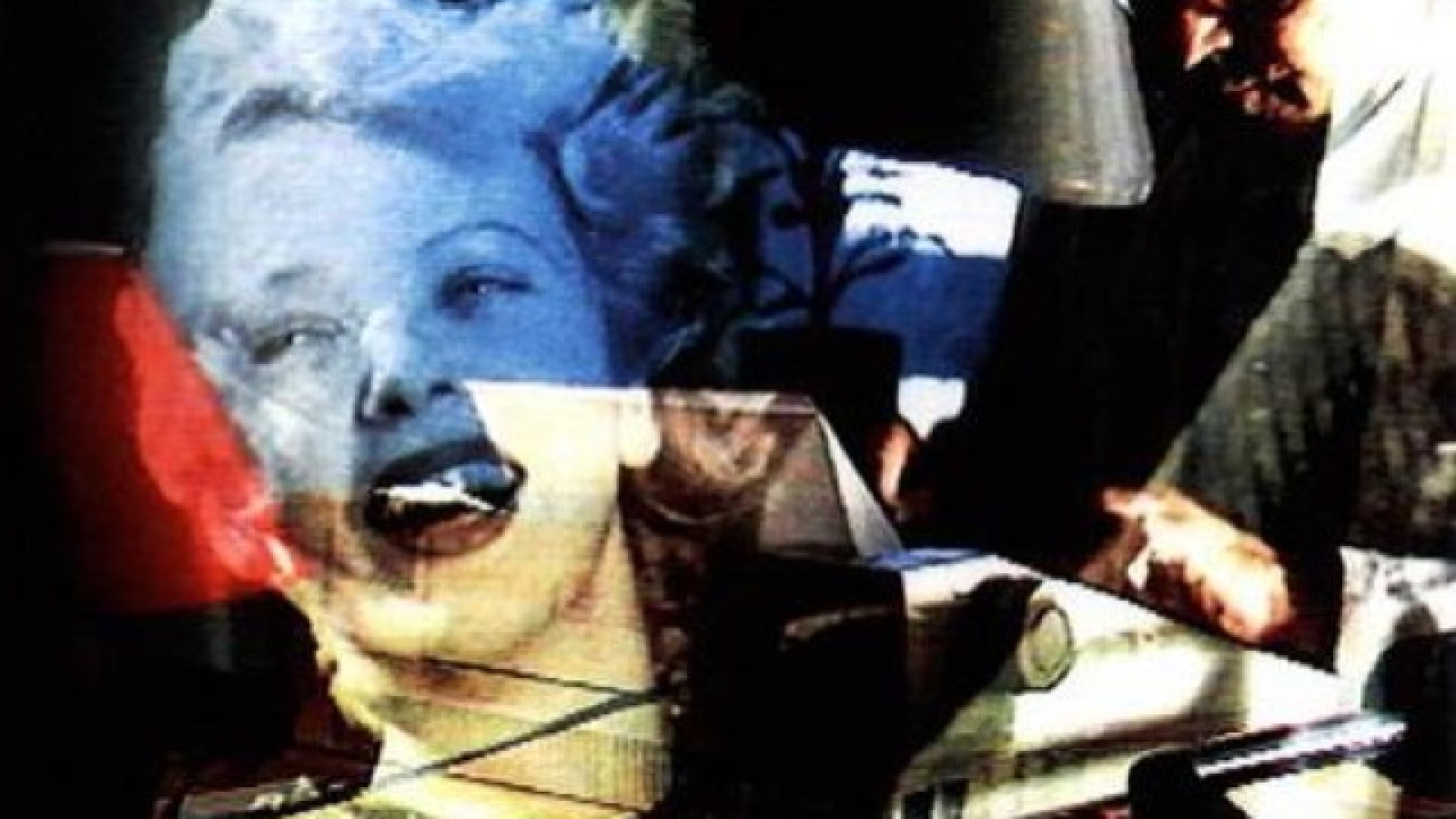 |
Histoire(s) du cinéma (1998) |
So, to come to Histoire(s) du cinéma itself, I think it’s probably the reason that Godard really has been positioned once again at the centre of debates since the turn of the millennium. I think this project was so mammoth in ambition and in scale that we’re still only beginning to engage with its implications. He’s not just trying to tell the history of cinema from the late nineteenth century to the present – though he is kind of doing that – but he’s equally interested in the impact of films on the century and particularly on the subjectivity. So how the making and the consumption and reception of films have informed how people behave and inhabit the world, and in that respect it’s a history of mentalities, it’s a history of behaviour, as much as it is a history of forms. So from the beginning it was envisioned, not just as a history of cinema, but a history of the twentieth century through cinema and a kind of investigation of the interpenetration of the two, which is something that few writerly historians have attempted to do. Some have broached aspects of that in writing, but for Godard the key challenge was always to do it audio visually and then to communicate those findings through feelings and sensations and through inference, all of the things that cinema does so brilliantly, rather than through language.
And, of course, it’s maybe worth just adding that Histoire(s) du cinéma began life as this extraordinary 8-part video series but it was subsequently released both as a set of books and as a set of CDs. So there’s an audio version and there’s a book version and then there’s a 35mm distilled version, which is very interesting and which we’re showing during the retrospective because it’s basically a kind of remix and Godard excludes great swathes of the original but also throws in a few additional references, a few additional quotations.
You met and interviewed Godard yourself a few years ago. What were your impressions of him as a person?
It was at the time of Notre Musique, which was made in 2004 and came out in 2005. This was at a time when Godard was living in Rolle, where he still lives today on the banks of Lake Geneva, but he was still in this extraordinary studio where he had an apartment upstairs and the downstairs was a kind of big library with stacks and stacks of dvds on shelves and so on but it also had a kind of production space. He’s moved out of there now, but when I interviewed him it was in that studio and it was at a time when he was working on the exhibition Voyage(s) en utopie, which he staged at the Pompidou Centre in 2006, and to me he couldn’t have been nicer and more welcoming and above all eager to talk. I know that isn’t the experience of everyone who has interviewed him and often people have not had great experiences, but I think it’s partly how you happen to catch him and whether he’s in a mood to talk.
I think generally when he’s building up and preparing for a new film he doesn’t really want to talk, but when he’s just completed a project and he’s in a kind of down period, in my experience he’s very accommodating. But my overriding impression of him from that period was his energy. He was in his mid-70s and he looked like he was humming with energy. He was juggling various projects; he was talking about all these plans. I mean it’s not the kind of thing I have come across in meeting people in their mid-70s that often.
Since 2000 Godard has returned to critical favour, especially with Eloge de l’amour (In Praise of Love) in 2001 and last year’s Adieu au langage (Goodbye to Language, 2014). To me the most extraordinary thing about these films – more so than their narrative content – is their exploration of pure cinema aesthetics. In your view do you think these films represent a new progression in Godard’s work or are they, in a sense, more a return to his earliest preoccupations?
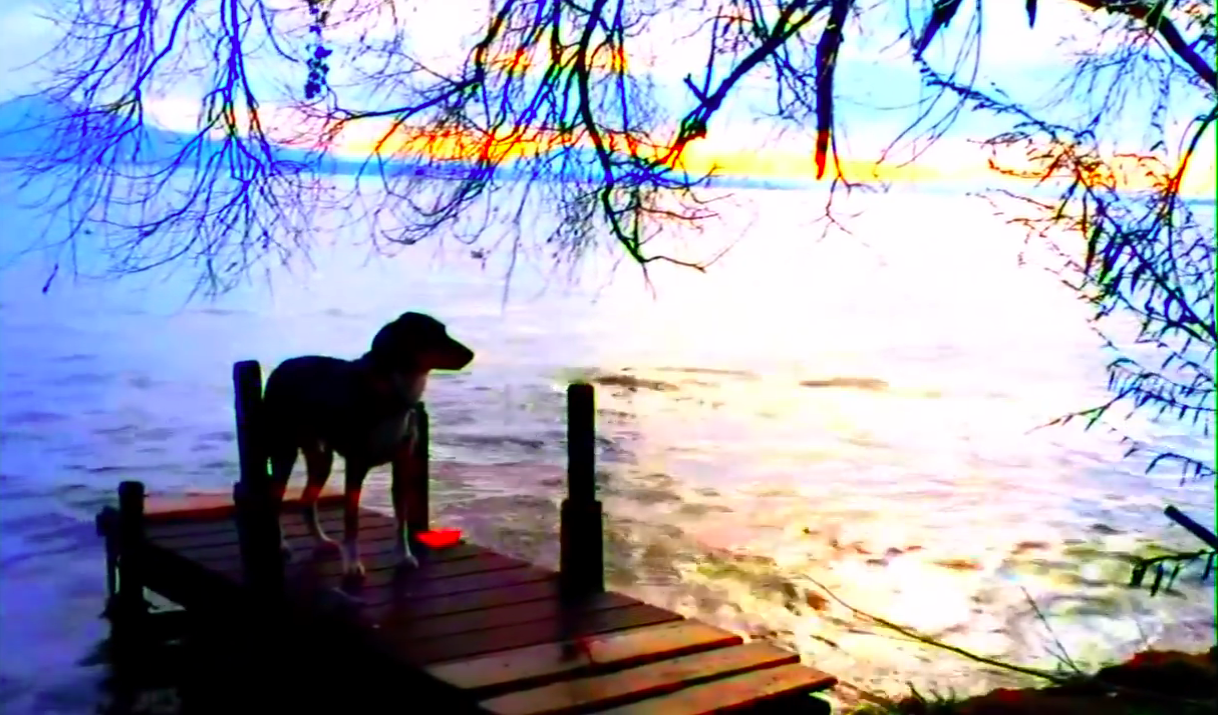 |
Goodbye to Language, 2014 |
I think you’re right to say there’s something similar about those two films. I think it’s worth noting that there are a couple of others, which are Notre Musique and Film Socialisme and there’s also the exhibition Voyage(s) en utopie, that I think are slightly different.
I think Eloge de l’amour and Adieu de langage demonstrate the kind of freedom that Godard feels now to just do what he really wants to do without feeling that he has to prove anything. So I think aesthetically both of those films are very unusual and stunning, particularly Adieu au langage. But I remember seeing Eloge de l’amour when it came out, with this deep saturated black and white that then flips into this extraordinary worked video palette in the second half when you jump back in time two years. So I think what one sees is partly a pleasure in that freedom and he’s fortunate in a sense to have producers who are willing to work with him over quite extended periods and to support those films.
But I also think that the other films that I alluded to, Notre Musique and Film Socialisme, demonstrate a resurgence or at least a reconnection on Godard’s part with a more confrontational, and a more explicitly political aesthetic, which maybe ties in with his work of the late 60s, but particularly with his militant work with the Dziga Vertov group period. Godard has tended to be quite critical of his own work of that period but it was notable that in the Voyage(s) en utopie exhibition at the Pompidou centre for the first time he was actively incorporating material from that time into the exhibition. So if there’s a kind of poetic, aesthetic freedom I think that has been accompanied by this reminder that Godard has a quite sharp political bite, and I think that he’s produced some of his most explicitly political work of his career in the last ten years. So it’ll be interesting to see what his current film looks like in that respect.
Today cinema seems more formulaic than ever and the major Hollywood studios as dominant as they’ve ever been, and Godard himself has expressed his frustration at this state of affairs. What aspects of Godard’s filmmaking do you think might be most inspiring to young directors and filmgoers who might be seeing his work for the first time in a season like this?
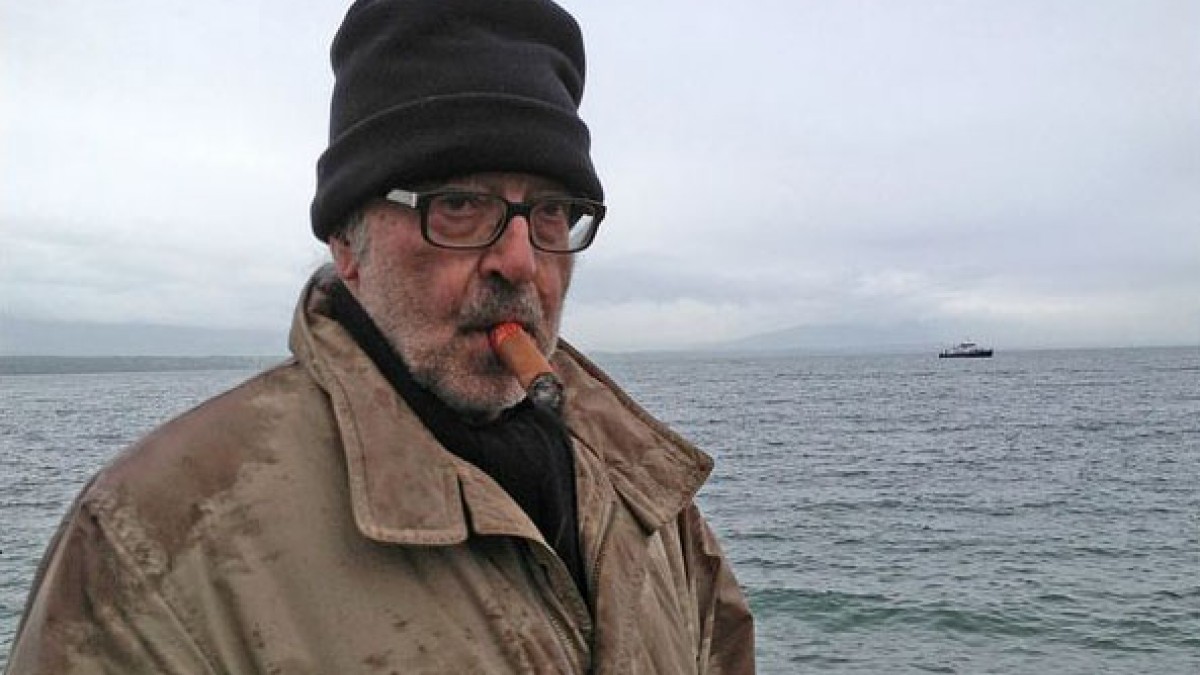 |
In Passion, his film from 1982, there’s a kind of exchange between the filmmaker who’s played by Jerzy Radziwilowicz and the cinematographer who is played by Raoul Coutard, and the exchange is roughly along the lines of: “There are no rules in the cinema, isn’t that right Mr Coutard?” And Coutard says: “Yes that’s right, there’s no rules.” And I think that is the big lesson from Godard: if you follow rules, you will make a certain type of cinema. There’s no predetermined formula for what a film should be or look like in terms of narrative, in terms of length, in terms of framing, or anything. And what Godard has demonstrated prodigiously and eloquently, from his early shorts through to the present, is that if you follow your intuition and if you experiment, that you can invent your own rules and that’s one of the extraordinary things that cinema allows.
Interview by Simon Hitchman, © December 2015 - please do not reprint or reuse without permission. |